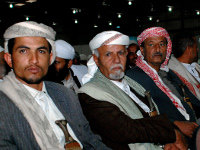{
"authors": [
"Nadwa Al-Dawsari",
"Nabeel Khoury",
"Christopher Boucek"
],
"type": "event",
"centerAffiliationAll": "dc",
"centers": [
"Carnegie Endowment for International Peace",
"Malcolm H. Kerr Carnegie Middle East Center"
],
"collections": [],
"englishNewsletterAll": "menaTransitions",
"nonEnglishNewsletterAll": "",
"primaryCenter": "Carnegie Endowment for International Peace",
"programAffiliation": "MEP",
"programs": [
"Middle East"
],
"projects": [],
"regions": [
"Middle East",
"Yemen",
"Gulf"
],
"topics": [
"Political Reform",
"Security",
"Economy"
]
}
Tribal Conflict and Resolution in Yemen
Fri, March 19th, 2010
Washington, D.C.
In Yemen's more rural regions, the infrastructure of a formal legal system is not in place. Instead tribal law enjoys significant legitimacy and support as an effective and efficient means of conflict resolution. However, social and economic changes within Yemen have begun to weaken tribal traditions, threatening an already fragile stability. Nadwa Al-Dawsari of Partners for Democratic Change spoke at Carnegie about Yemen's tribal legal system and some of the challenges it faces.
Tribal Customary Law
According to Al-Dawsari, Yemen's tribal customary law is based on consensus building and relies on shared perceptions of honor, collective responsibility, and the ability of each individual tribe to govern its own members. Conflicts between tribes are resolved through a complex arbitration process of mediation and appeals procedures, governed by tribal elders and sheiks.
Al-Dawsari argued that despite its informal character, tribal customary law is quite comprehensive, extending beyond personal injury law to comprise environmental and property regulations. Additionally, tribal customary law exhibits significant protections for women’s rights, allowing women decision-making power within the tribe, including the freedom to marry and divorce.
Tribal Law vs. Legal Infrastructure
Although it has some significant shortcomings, tribal customary law also enjoys some noteworthy strengths as a legal system. For Yemen's tribes, customary law is:
- Faster and more efficient than a formal legal infrastructure.
- Highly trusted and perceived as legitimate.
- More likely to produce verdicts that are understood and accepted by all parties.
The Erosion of Tribal Law
Tribal customary law is currently being challenged by significant social and economic changes like increasing poverty, rising unemployment, an overwhelmingly young population, and the steady spread of state authority. In areas where weakened tribal authority has not been compensated by the emergence of the state, instability has ensued.
Al-Dawsari suggested that international donors should work to improve Yemen's human development through education and microfinance to counter the draw of terrorism and drugs. Additionally, local governance capacity should be strengthened by working with local councils, NGO's and existing conflict resolution structures.
Carnegie does not take institutional positions on public policy issues; the views represented herein are those of the author(s) and do not necessarily reflect the views of Carnegie, its staff, or its trustees.
Event Speakers
Nadwa Al-Dawsari
Non-Resident Scholar at the Middle East Institute

Nadwa Al-Dawsari is a veteran researcher, conflict analyst, and policy advisor with 20 years of field experience in Yemen and the broader Middle East. Currently, she serves as a non-resident scholar at the Middle East Institute (MEI) and a fellow at the Center on Armed Groups. She has provided advisory services to policymakers, US and European donors, regional actors, UN agencies, and humanitarian organizations. Nadwa is regularly featured as a guest speaker on panel discussions about Yemen and the broader Middle East and her work has been widely published by the top think tanks in the United States and Europe.
Nabeel Khoury
